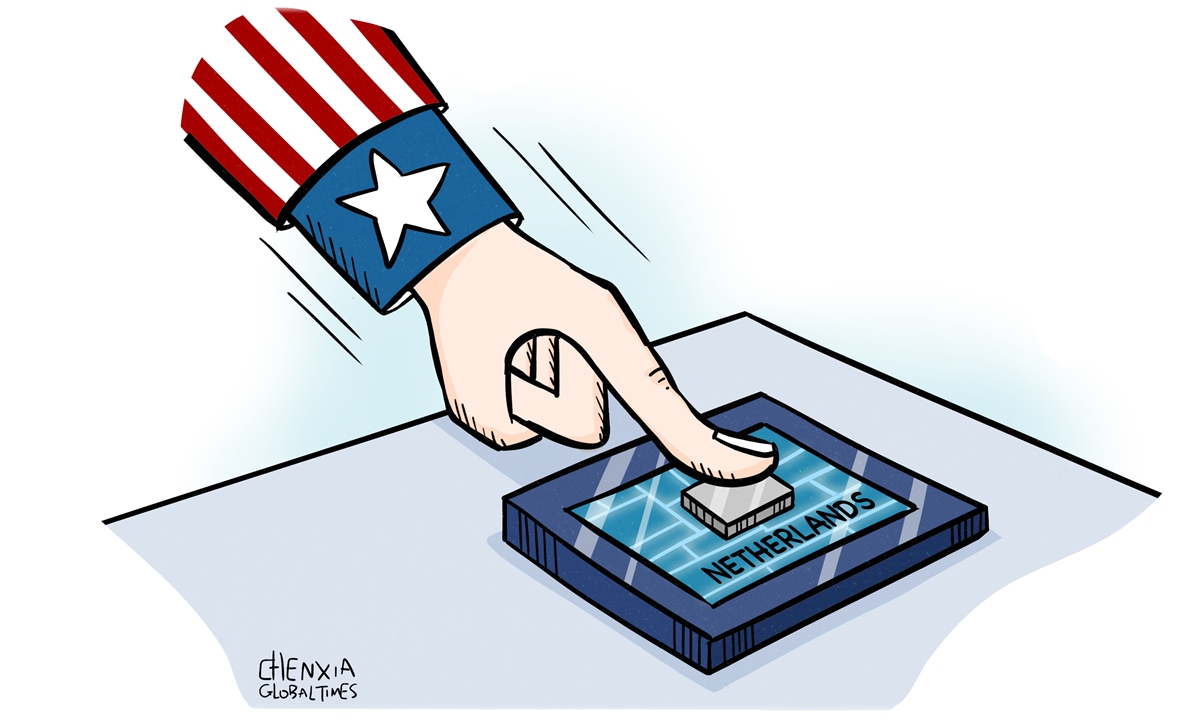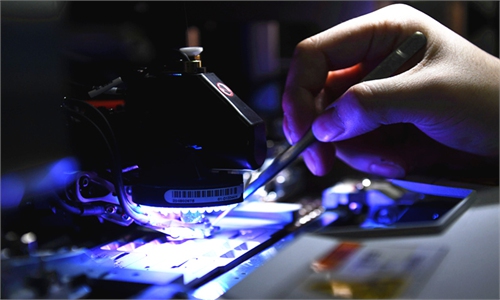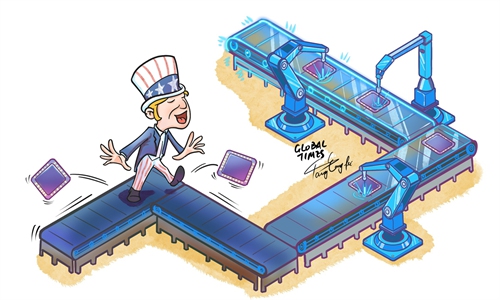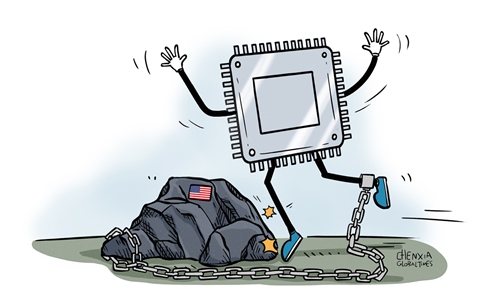Chip competitiveness is the best defense to Netherlands’ interests amid US pressure

Illustration: Chen Xia/Global Times
Before a visit to the US by Dutch Prime Minister Mark Rutte on Tuesday, top Dutch trade official said the Netherlands "will not summarily accept new US restrictions on exporting chip-making technology to China," and is consulting with "European and Asian allies," Reuters reported.The White House said in a statement that US President Joe Biden and Rutte will "discuss our cooperation on critical technologies." Although the White House uses the word "cooperation," it sounds like simply diplomatic rhetoric, and observers generally predict that there won't be equal cooperation between the US and Netherlands, but only unreasonable suppression on the latter. The Netherlands should withstand pressure from the White House and pursue an independent economic policy driven by its own national interest, which is a critical premise for the healthy development of Dutch semiconductor industry.
The Biden administration in October 2022 announced its most aggressive measures to date aimed at limiting China's access to advanced computer chips and chip-making equipment. US restrictions on sales of high-end chips to China can profoundly impact semiconductor companies including Applied Materials (AMAT), KLA Corporation (KLAC), and Lam Research (LRCX), and because they are American companies, they are directly bound by Biden's chip ban. Other major global players in the chip-production equipment market are ASML Holding NV in the Netherlands and Japan's Tokyo Electron. Therefore, Washington is trying to coerce its allies, especially the Netherlands and Japan, to follow its path in banning chip technology to China.
It is clear that US restriction goes against the Netherlands' own economic interests. The Chinese mainland is ASML's third largest market in the world, with operating income of 2.7 billion euros ($2.9 billion), accounting for about 14.7 percent of its global turnover in 2021. The Dutch government should respect ASML's willingness to invest in the Chinese market, and at the very least, the government should defend Dutch companies' legitimate rights and interests, which is the responsibility of government officials. In the dispute, the Dutch government should stand on the side of ASML and defend its economic interests.
Semiconductors have been identified as a strategic core industry, and the result has been an intense global competition. In a world of increasing competition, the Netherlands should try to maintain its competitiveness in strategic industries at all costs, otherwise, the country's position in the global semiconductors value chain will soon be replaced by other nations, and the Netherlands are likely to gradually lose its bargaining power in negotiations with the US.
In fact, weakening the competitiveness of other countries, including not only China but also all the competitors such as the Netherlands, may be exactly the purpose of US policies. The US government in August signed into law the CHIPS and Science Act of 2022, which includes more than $52 billion in incentives for domestic semiconductor production and research, as well as an investment tax credit for semiconductor manufacturing. With the White House putting domestic production of semiconductors at the center of its economic policymaking, the US is focusing on revitalizing its domestic manufacturing through non-market means, and its incentives are likely to attract some companies to move production to the US and hollow out other countries' economy. It has been repeatedly proved that Washington doesn't care about its allies' economic interests at all.
Although the Biden administration restricted exports of certain equipment and services to Chinese semiconductor companies, Washington will probably give preferential treatment to US firms, which also see China as an important overseas market. The chief executive of ASML said in December that the US push to get the Netherlands to adopt new rules restricting exports to China is contradictory. "American companies benefit from the fact that we are not allowed to supply extreme ultraviolet to China," CEO Peter Wennink said in an interview with newspaper NRC Handelsblad. Wennink said it seemed contradictory that US chip manufacturers can sell their most advanced chips to Chinese customers, while ASML is only able to sell older chipmaking equipment, according to media reports.
China's Ministry of Commerce said in December it had filed a complaint against the US at the World Trade Organization (WTO) in response to new controls from Washington on semiconductor trade with China since October. The US' new export control measures are in direct violation of the WTO's obligations including Most-Favoured-Nation treatment and prohibition of Quantitative Restrictions. The Chinese government has every right to launch a lawsuit to the WTO dispute settlement mechanism in accordance with WTO rules and win the support of other WTO members.
The Netherlands should support China, because effort to support China is to support its own enterprises. In the face of US pressure and unreasonable suppression, maintaining the competitiveness in strategic core industries should become the first priority of the Netherlands.
The author is a reporter with the Global Times. bizopinion@globaltimes.com.cn



